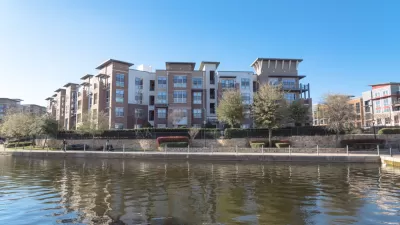Mike Sheridan looks at the changing types of workspaces being demanded by knowledge-economy businesses. These aren't your parents' cubicle-filled steel and glass boxes.
Sheridan explores the impacts of the emerging information-based economy on everything from the design of multifamily housing to corporate campuses.
"Not only are high-tech companies looking for unusual spaces that are reflective of their corporate culture, but firms in the knowledge sector are also reviving inner-city neighborhoods, spearheading the drive for sustainability, and even changing the way some new buildings are designed."
"Today's creative class drives the knowledge economy, and participants tend to want both their home and workplace to be in a walkable urban place with coffee shops, entertainment, and stores," says Christopher B. Leinberger, president of LOCUS, a real estate policy advocate for walkable and transit-oriented development (TOD).
"Thus, builders, architects, and designers must think in a different way. Over the past half-century, the U.S. real estate sector was like NASCAR, Leinberger adds. 'NASCAR drivers drive 150 miles an hour and just go straight or turn to the left,' he says. But building professionals now have to do things differently, he says, and learn how to develop complex and more risky walkable urban projects."
FULL STORY: Building for the Needs of an Information-Based Economy

Maui's Vacation Rental Debate Turns Ugly
Verbal attacks, misinformation campaigns and fistfights plague a high-stakes debate to convert thousands of vacation rentals into long-term housing.

Planetizen Federal Action Tracker
A weekly monitor of how Trump’s orders and actions are impacting planners and planning in America.

San Francisco Suspends Traffic Calming Amidst Record Deaths
Citing “a challenging fiscal landscape,” the city will cease the program on the heels of 42 traffic deaths, including 24 pedestrians.

Bend, Oregon Zoning Reforms Prioritize Small-Scale Housing
The city altered its zoning code to allow multi-family housing and eliminated parking mandates citywide.

Amtrak Cutting Jobs, Funding to High-Speed Rail
The agency plans to cut 10 percent of its workforce and has confirmed it will not fund new high-speed rail projects.

LA Denies Basic Services to Unhoused Residents
The city has repeatedly failed to respond to requests for trash pickup at encampment sites, and eliminated a program that provided mobile showers and toilets.
Urban Design for Planners 1: Software Tools
This six-course series explores essential urban design concepts using open source software and equips planners with the tools they need to participate fully in the urban design process.
Planning for Universal Design
Learn the tools for implementing Universal Design in planning regulations.
planning NEXT
Appalachian Highlands Housing Partners
Mpact (founded as Rail~Volution)
City of Camden Redevelopment Agency
City of Astoria
City of Portland
City of Laramie



























